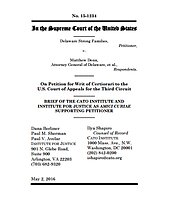Learn more about Cato’s Amicus Briefs Program.
Delaware Strong Families is a faith-based 501(c)(3) dedicated to rebuilding “a culture of marriage, family, and freedom and raise up the next generation of leaders.” Under the federal tax code, 501(c)(3)s are prohibited from engaging in direct political advocacy. Delaware recently passed a law, however, that broadens the state’s definition of “electioneering communication” to almost the furthest degree possible. The law covers any communication that can reach even a single Delaware voter—whether through the internet, delivered through the mail, or through more traditional media formats—and that mentions the name of a candidate, even if not advocating for or against the candidate. If an organization makes such a communication, then they must disclose all donors who gave $100 total over the previous four years. Delaware Strong Families publishes a neutral voter guide that collects candidates’ positions on various issues and neither endorses or opposes any candidate. Nevertheless, the guide counts as an “electioneering communication” in Delaware and thus DSF has to disclose its donors. Represented by the Center for Competitive Politics, DSF challenged the law as a violation of the right to speak and give anonymously. The Supreme Court has consistently upheld the right to anonymity in both speech and giving, most prominently in NAACP v. Alabama (1958), when the Court stopped the Alabama attorney general’s attempt to obtain the NAACP’s membership lists. After winning a preliminary injunction in the district court, DSF lost in the Third Circuit. The Third Circuit’s opinion essentially rubber stamped the law without meaningfully scrutinizing whether the government has any substantial interest in knowing who gives a charity $25 a year over four years. Now, DSF is seeking vindication of its constitutional rights from the Supreme Court. Cato, joined by the Institute for Justice, filed a brief supporting DSF’s request for Supreme Court review. We point out that there is a growing trend of states passing onerous campaign finance laws and that too many courts are rubber stamping those laws without meaningful scrutiny. Given the heated rhetoric around “money in politics,” there is also reason to believe that many of these laws are intended to make speaking out so difficult that organizations like DSF stop practicing their rights to freedom of speech. When the government’s motives are suspicious, then that is all the more reason for the Supreme Court to step in. Finally, we argue that the law is particularly dangerous because it makes no distinction between 501(c)(3)s and other organizations that are allowed to advocate politically, such as 501(c)(4)s. There are almost one million 501(c)(3)s in the country. They are hospitals, community organizations, art centers, radio stations, and many more. America is fertile ground for these socially beneficial organizations, and no one who gives $25 a year should be forced to disclose that fact to the government. The Supreme Court should take the case to clarify that the right to speak and give anonymously still has constitutional weight.
